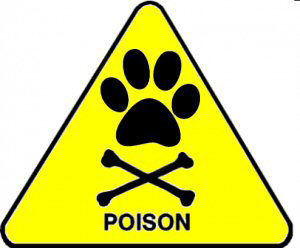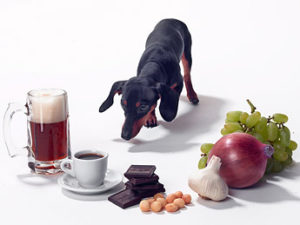Poisonous Substances
Some foods that are considered good for people can be very dangerous for pets. The list below highlights some of the most common foods that can be dangerous to animals.
This is not an exhaustive list, and any decision to provide your pet with food not specifically intended for animals should be discussed with your veterinarian or pet nutritionist. For more information on foods that could be unsafe for pets, visit the ASPCA’s“People Foods to Avoid Feeding Your Pets” page.
The following foods may be dangerous to your pet
- Alcoholic beverages
- Apple seeds
- Apricot pits
- Avocados
- Cherry pits
- Candy (particularly chocolate—which is toxic to dogs, cats, and ferrets—and any candy containing the toxic sweetener Xylitol)
- Coffee (grounds, beans, and chocolate-covered espresso beans)
- Garlic
- Grapes
- Gum (can cause blockages and sugar free gums may contain the toxic sweetener Xylitol)
- Hops (used in home beer brewing)
- Macadamia nuts
- Moldy foods
- Mushroom plants
- Mustard seeds
- Onions and onion powder
- Peach pits
- Potato leaves and stems (green parts)
- Raisins
- Rhubarb leaves
- Salt
- Tea (because it contains caffeine)
- Tomato leaves and stems (green parts)
- Walnuts
- Xylitol (artificial sweetener that is toxic to pets)
- Yeast dough
(Provided by Pet Tech: PetSaver Program)
(Either the root, seed, stem or leaves are poisonous)
|
Amaryllis Andromed Apple Seeds Arrow Grass Avocado Seed Azalea Bittersweet Boxwood Buttercup Caladium Castor Bean Cherry Pits Chokecherry Climbing Lily Crown of Thorns |
Daffodil Bulbs Daphne Delphinium Dieffenbachia Dumb Cane Elephant Ear English Ivy Elderberry Foxglove Hemlock Holly Hyacinth Bulbs Hydrangea Iris Bulbs Japanese Yew |
Jasmine Berries Jerusalem Cherry Jimson Weed Laburnum Larkspur Laurel Locoweed Marigold Marijuana Mistletoe Berries Monkshood Mushrooms Narcissus Bulbs Nightshade Oleander |
Peach Philodendron Poison Ivy Poinsettias Privet Rhododendron Rhubarb Snow on the Mountain Stinging Nettle Toadstool Tobacco Tulip Bulbs Walnut Wisteria Yew |
Common Household Products That Are Poisonous to Pets
|
Acetaminophen Aftershave Antifreeze Aspirin Bleach Boric Acid Brake Fluid Carburetor Cleaner Cleaning Fluid Deodorants Deodorizers Detergents |
Disinfectants Drain Cleaner Dyd Fungicides Furniture Polish Gasoline Hair Colorings Herbicides Insecticides Kerosene Laxatives Lead |
Mineral Spirits Mothballs Nail Polish Nail Polish Remover Paint Permanent Solution Photo Developer Rat Poison Rubbing Alcohol Shoe Polish Sleeping Pills Snail & Slug Bait |
Soaps Suntan Lotion Tar Toilet Bowl Cleaners Turpentine Windshield Washer Fluid Wood Preservatives |
Special Note: Pennies since 1982 may be fatal if swallowed by a dog because they contain zinc. Also, nuts and bolts contain zinc and don’t easily pass through the digestive system. They sit in the stomach and are dissolved by the stomach acids, slowly poisoning the pet. Symptoms include jaundice, vomiting and difficulty in breathing. If you suspect a dog has ingested pennies or any other foreign objects, have the pet x-rayed.


